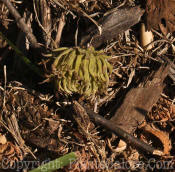First
of all, do not confuse members of this genus
which are the "true" chestnuts with another
species called the horse chestnut which belongs
to the species, (Aesculus
hippocastanum).
 At one time, large parts of the Northeast United States
were covered with chestnut trees. Just after
1900, a fungal disease called
chestnut blight swept through the native
populations of the American Chestnut (Castanea
dentata) killing millions of trees. Rare
individuals may still be found in woodlots.
Today, research is still ongoing to find
American chestnut trees that are resistant to
this disease.
At one time, large parts of the Northeast United States
were covered with chestnut trees. Just after
1900, a fungal disease called
chestnut blight swept through the native
populations of the American Chestnut (Castanea
dentata) killing millions of trees. Rare
individuals may still be found in woodlots.
Today, research is still ongoing to find
American chestnut trees that are resistant to
this disease.
Some of the other species of chestnut also
produce edible nuts (BTW - horsechestnuts are
considered poisonous unless given the proper
treatment) but the American chestnut is still
highly prized. Several of the other chestnut
species are resistant to chestnut blight.



